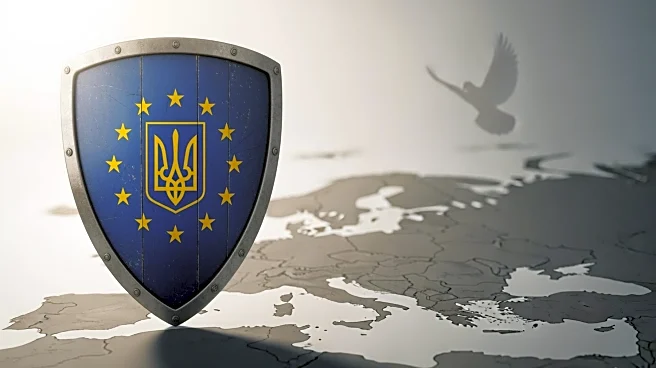What's Happening?
Ukrainian President Volodymyr Zelenskyy is scheduled to meet with European leaders in London to discuss military aid and strategies to protect Ukraine from Russian aggression. Hosted by British Prime Minister
Keir Starmer, the meeting will focus on enhancing Ukraine's air defenses, safeguarding its power grid from frequent drone and missile attacks, and supplying Kyiv with longer-range missiles. The talks aim to increase pressure on Russian President Vladimir Putin, following recent sanctions targeting Russia's oil and gas exports. Despite efforts to negotiate peace, Putin has resisted, maintaining that Russia's invasion is legitimate. The meeting will also address future security guarantees for Ukraine as the conflict approaches its fourth anniversary.
Why It's Important?
The discussions in London are crucial as they represent a coordinated effort by Western allies to support Ukraine amidst ongoing hostilities. The potential military aid and security guarantees could significantly impact Ukraine's ability to defend itself and stabilize its infrastructure. The meeting underscores the geopolitical tensions between Russia and NATO countries, with implications for international relations and security policies. The outcome could influence the strategic balance in Eastern Europe and affect global energy markets, given the sanctions on Russian exports. The commitment of Western nations to Ukraine's defense highlights the broader stakes in the conflict, including the preservation of sovereignty and democratic values.
What's Next?
The meeting is expected to further develop the concept of a 'reassurance force' to support Ukraine, focusing on air and naval capabilities rather than deploying Western troops. The headquarters for this force may rotate between Paris and London. As the conflict continues, Western allies face challenges in funding Ukraine's recovery and establishing postwar security arrangements. The ongoing war of attrition and frequent drone attacks highlight the urgency of these discussions. The international community will closely monitor the outcomes, which could shape future diplomatic and military strategies in the region.
Beyond the Headlines
The ethical and legal dimensions of the conflict are significant, as the international community grapples with the implications of supporting Ukraine while avoiding direct confrontation with Russia. The long-term impact on European security architecture and NATO's role in regional stability are critical considerations. The conflict also raises questions about the effectiveness of sanctions and the resilience of global supply chains, particularly in energy markets. The cultural and humanitarian aspects, including the displacement of civilians and the destruction of infrastructure, continue to be pressing issues.










